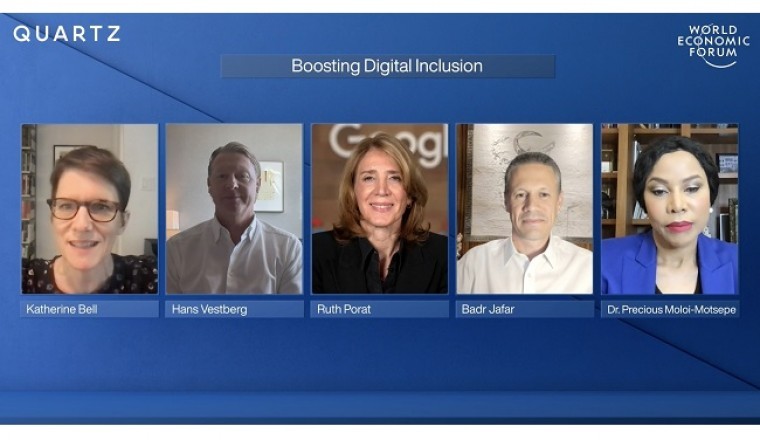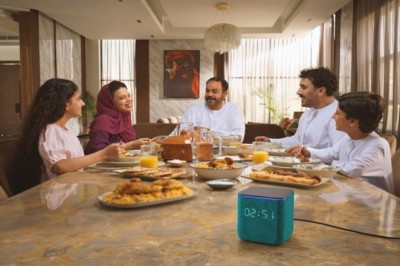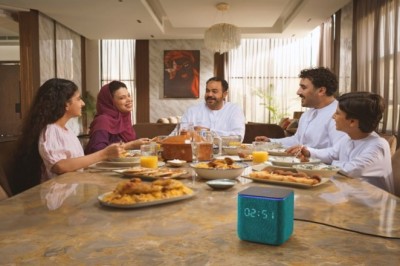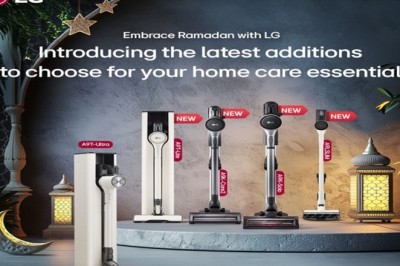
- EDISON Alliance 1 Billion Lives Challenge is a challenge to improve 1 billion lives globally by 2025 through affordable and accessible digital solutions.
- According to the World Economic Forum’s EDISON Alliance, an estimated 8 billion people worldwide are offline, and the cost of available broadband exceeds affordability targets in 50% of developed countries.
Sharjah, United Arab Emirates (AETOSWire) : Crescent Enterprises CEO Badr Jafar, participated in the World Economic Forum EDISON Alliance discussion on Boosting Digital Inclusion alongside Hans Vestberg, Chairman and CEO of Verizon and Chairman of the EDISION Alliance, Ruth Porat, Senior Vice-President and CFO of Google, and Dr. Precious Moloi-Motsepe, Co-Founder and CEO of the Motsepe Foundation.
The discussion, moderated by Quartz Media Editor-in-Chief Katherine Bell, was hosted by the EDISON Alliance, a global movement of private and public sector Champions committed to prioritising digital inclusion for the achievement of the United Nations Sustainable Development Goals. The discussion was held against the backdrop of the EDISON Alliance 1 Billion Lives Challenge, a challenge to improve 1 billion lives globally by 2025 through affordable and accessible digital solutions.
With an estimated 47% of people worldwide offline, and the cost of available broadband exceeding affordability targets in 50% of developed countries, Badr Jafar, an appointed Champion of the Edison Alliance, stressed that digital inclusion is a means to an end, “Addressing the global challenges that humanity and our habitat faces is of course the ultimate goal. Technology is a means to that end, and it isn’t the agent of change, either. We, the connected people, are the true agents of change. And history will judge us on whether we really used these tools for the collective betterment of humanity and our planet.”
According to a recent report by the Middle East Institute, information and communications technology (ICT) spending in Saudi Arabia was expected to exceed $37 billion in 2020. Meanwhile, the UAE’s ICT spending is estimated to reach $23 billion by 2024, while Qatar’s spending will amount to approximately $9 billion.
On innovative investment models needed for digital inclusion, Jafar highlighted that the business case for connecting the unconnected is inarguable, with an estimated 70% of new value created in the economy over the next decade to be based on digitally enabled platforms. Jafar underlined, “Today, with trillions of dollars of capital chasing yield in a zero interest rate environment, long-term stable tariff-based investment opportunities, like digital infrastructure, is super compelling. The questions we must address is how can we ensure regulatory and investment frameworks are clear, transparent, and compelling enough to accelerate this investment?”
Badr Jafar also emphasised the need to also address the digital divide through a business lens, considering the significant and widening digital gap between small and medium-sized enterprises (SMEs) and larger businesses. As an EDISON Alliance partner, Crescent Enterprises, aims to focus efforts on scaling up the digital capacities of SMEs in the Middle East and North Africa region, in which SMEs account for over 90% of all businesses and are a major source of much-needed job creation and economic growth.
The EDISON Alliance Boosting Digital Inclusion panel was held as a part of the World Economic Forum’s virtual Sustainable Development Impact Summit 2021. The Summit, hosted in parallel with the United Nations General Assembly, convenes global leaders across sectors, disciplines, and geographies to exchange knowledge, innovative approaches, and promising ideas to accelerate post-pandemic recovery on the road to achieving the United Nations Sustainable Development Goals.



















Facebook Conversations
Disqus Conversations